
Mitigation and Adaptation Strategies for Global Change
Scope & Guideline
Pioneering Strategies to Combat Global Change
Introduction
Aims and Scopes
- Climate Change Mitigation Strategies:
Research on innovative methods and technologies aimed at reducing greenhouse gas emissions across various sectors, including energy, agriculture, and forestry. - Climate Change Adaptation Practices:
Exploration of strategies and practices that enhance resilience to climate change impacts, particularly in vulnerable communities and ecosystems. - Sustainable Development Goals (SDGs) Integration:
Investigating how climate actions can align with and support the achievement of the United Nations Sustainable Development Goals. - Socio-Ecological Systems Approach:
Emphasis on understanding the interactions between social and ecological systems in the context of climate change, highlighting participatory and community-based strategies. - Policy Analysis and Governance:
Evaluation of policy frameworks, governance structures, and institutional arrangements that facilitate or hinder effective climate action. - Technological Innovations:
Assessment of new technologies and practices that can contribute to both mitigation and adaptation efforts in various sectors.
Trending and Emerging
- Climate-Smart Agriculture:
There is a notable increase in research focused on climate-smart agricultural practices that enhance productivity while mitigating the impacts of climate change. - Community Resilience and Participatory Approaches:
Emerging studies emphasize the importance of community engagement and participatory methods in developing effective adaptation strategies, reflecting a shift towards inclusive governance. - Nature-Based Solutions:
Research exploring the role of ecosystem services and nature-based solutions in climate adaptation and mitigation is gaining prominence, highlighting the interconnectedness of environmental health and climate strategies. - Technological Innovations for Climate Solutions:
An upward trend in the exploration of cutting-edge technologies, such as carbon capture and storage, renewable energy solutions, and advanced agricultural techniques, is evident in recent publications. - Intersectionality in Climate Vulnerability:
The analysis of how different social factors, such as gender and socioeconomic status, intersect to influence vulnerability and adaptation strategies is becoming a focal point of research.
Declining or Waning
- Traditional Agricultural Practices:
Research focusing solely on traditional agricultural methods without integration of climate-smart practices is becoming less frequent, as there is a shift towards innovative, sustainable agricultural solutions. - Single-Factor Climate Impact Studies:
Studies that examine the impact of climate change from a singular perspective, such as only economic or ecological, are declining in favor of more holistic and integrated approaches. - Generalized Climate Policy Discussions:
Broad discussions about climate policy without specific case studies or actionable insights are less common, as there is a trend towards detailed analyses that provide concrete recommendations. - Static Vulnerability Assessments:
Assessments that do not account for dynamic changes in climate impacts or adaptive capacities are becoming less relevant, as there is a growing emphasis on adaptive management and resilience building.
Similar Journals
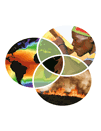
Wiley Interdisciplinary Reviews-Climate Change
Connecting experts to shape the future of our planet.Wiley Interdisciplinary Reviews-Climate Change is a leading peer-reviewed journal published by WILEY, focusing on the multifaceted aspects of climate change, its impacts, and potential solutions. With an ISSN of 1757-7780 and an E-ISSN of 1757-7799, this journal has established itself as a vital resource for researchers and professionals addressing pressing climatic issues. Boasting an impressive 2023 impact factor, it holds a Q1 ranking in prestigious categories such as Atmospheric Science, Geography, Planning and Development, and Global and Planetary Change. With a significant global reach, it ranks 6th in Social Sciences and 3rd in Earth and Planetary Sciences within Scopus metrics, emphasizing its relevance and high-quality contributions. The journal promotes interdisciplinary research that bridges science, policy, and societal responses to climate change, making it an essential platform for advancing knowledge and informing practice in the field. Researchers, students, and professionals are encouraged to engage with and contribute to this esteemed publication, which continues to shape the dialogue surrounding climate change from 2010 to 2024 and beyond.

Frontiers in Sustainable Food Systems
Exploring interdisciplinary solutions for global food security.Frontiers in Sustainable Food Systems, published by FRONTIERS MEDIA SA, stands at the forefront of interdisciplinary research in sustainable food practices, agriculture, and global ecological impacts. This open-access journal, launched in 2018, aims to disseminate innovative findings that reshape our understanding of food systems' sustainability and resilience. With a significant impact factor and ranking in the top quartile across various categories such as Agronomy and Crop Science, Ecology, and Food Science, it is positioned as a leading platform for scholars and practitioners alike. The journal’s commitment to addressing the pressing challenges of food security and environmental sustainability ensures its relevance in today’s rapidly evolving landscape. It is a vital resource for researchers, professionals, and students dedicated to advancing sustainable practices in food systems globally.
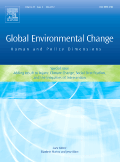
GLOBAL ENVIRONMENTAL CHANGE-HUMAN AND POLICY DIMENSIONS
Empowering Change Through Evidence-Based ResearchGLOBAL ENVIRONMENTAL CHANGE-HUMAN AND POLICY DIMENSIONS is a premier academic journal published by Elsevier Science Ltd, based in the United Kingdom. With a significant focus on the interplay between human activities and environmental change, this journal serves as a critical platform for researchers and policymakers alike. It boasts an impressive impact factor and ranks in the top quartile (Q1) across multiple categories, including Ecology, Geography, and Environmental Science, reflecting its high relevance and influence within the respective fields. The journal provides insightful analyses and empirical studies from 1990 to 2024, fostering a deeper understanding of the socio-political dimensions of global environmental issues. Although it does not offer open access options, readers can still access the journal through various university libraries and institutional subscriptions, ensuring wide dissemination of important research findings. With its dedication to promoting interdisciplinary dialogue and evidence-based policy development, GLOBAL ENVIRONMENTAL CHANGE remains an invaluable resource for academics, practitioners, and students committed to addressing pressing environmental challenges.
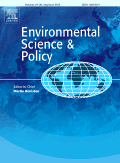
ENVIRONMENTAL SCIENCE & POLICY
Connecting research and policy for a greener tomorrow.ENVIRONMENTAL SCIENCE & POLICY, a leading journal published by Elsevier, serves as a pivotal platform for research that intertwines environmental science with policy development. With an ISSN of 1462-9011 and an E-ISSN of 1873-6416, this journal contributions outrival many, reflected by its 2023 Scopus rankings placing it in the Q1 category in both Geography, Planning and Development (Rank #36/821, 95th percentile) and Environmental Science, Management, Monitoring, Policy and Law (Rank #38/399, 90th percentile). Covering a broad spectrum of topics, it addresses critical interdisciplinary issues from 1998 to the present, fostering dialogue among researchers, policymakers, and practitioners alike. Although it does not offer Open Access options, the journal's rigorous peer-review process ensures high-quality and impactful publications, vital for anyone invested in advancing knowledge and practice in environmental governance and sustainable policy frameworks.
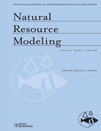
NATURAL RESOURCE MODELING
Transforming data into actionable strategies for resource sustainability.NATURAL RESOURCE MODELING is a prestigious academic journal published by Wiley, focusing on the critical intersection of environmental science and modeling and simulation techniques. With an ISSN of 0890-8575 and an E-ISSN of 1939-7445, the journal has established itself as a vital resource for scholars and practitioners since its inception in 1990. Covering a wide array of topics related to the sustainable management and modeling of natural resources, the journal currently holds a reputable Q2 ranking in Environmental Science and a Q3 ranking in Modeling and Simulation, highlighting its impact within these fields, particularly with Scopus rankings placing it in the 60th and 57th percentiles, respectively. Although not an Open Access journal, it offers researchers, professionals, and students invaluable insights and methodologies pertinent to advancing the knowledge base in environmental management. The journal's commitment to high-quality research and its comprehensive scope reinforce its importance as a go-to publication for anyone interested in the sustainable future of our natural resources.
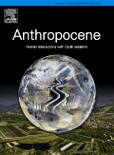
Anthropocene
Bridging Disciplines to Tackle Ecological IssuesAnthropocene, published by Elsevier Science Ltd, is a leading journal dedicated to the interdisciplinary study of the Anthropocene epoch, focusing on the profound impacts of human activity on Earth systems and ecosystems. With an impressive impact factor reflected in its Q1 rankings in Earth and Planetary Sciences and Ecology, as well as a solid standing in Global and Planetary Change, this journal is a vital resource for researchers, professionals, and students striving to understand and address the pressing environmental challenges of our time. Since its inception in 2013, the journal has been committed to publishing high-quality, peer-reviewed articles that stimulate critical discourse and inspire innovative solutions to complex ecological issues. Although not an open-access journal, Anthropocene provides extensive access options through institutional subscriptions, making its significant research readily available to the academic community. Based in the United Kingdom, the journal serves as a cornerstone for scholarship in a rapidly evolving field, bridging gaps across disciplines and encouraging interdisciplinary collaboration for a sustainable future.
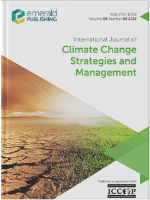
International Journal of Climate Change Strategies and Management
Empowering research to combat climate change challenges.Introducing the International Journal of Climate Change Strategies and Management, a premier publication dedicated to advancing the understanding and development of innovative strategies addressing climate change. Published by Emerald Group Publishing Ltd in the United Kingdom, this journal has established itself as a trusted source within the realms of development, geography, and environmental science. With an impressive 2023 impact factor reflecting its high citation rates and a Q1 classification in pivotal categories such as Development and Geography, the journal stands at the forefront of climate change discourse. Since adopting an Open Access model in 2018, it has broadened its reach, making cutting-edge research accessible to a global audience. The journal encompasses a wide array of topics essential for academics and practitioners alike, focusing on management, policy-making, and methods for effective monitoring of environmental strategies. By fostering interdisciplinary dialogue, the International Journal of Climate Change Strategies and Management is essential for those aiming to contribute to sustainable solutions in our rapidly changing world.

Frontiers in Sustainable Cities
Pioneering Research for Resilient CitiesFrontiers in Sustainable Cities, published by FRONTIERS MEDIA SA, is an esteemed academic journal dedicated to advancing the fields of Urban Studies, Renewable Energy, and Public Administration. With a commitment to open access since 2019, the journal facilitates the dissemination of high-quality research aimed at creating sustainable urban environments. Operating from Lausanne, Switzerland, this influential publication supports knowledge exchange among researchers, professionals, and students involved in the complex dynamics of urban sustainability. The journal has achieved notable recognition, reflected in its quartile rankings—Q1 in Urban Studies and Q2 in both Public Administration and Renewable Energy, Sustainability and the Environment—indicating its relevance and impact within the scholarly community. Researchers benefit from a broad reach through its open access policy, enhancing visibility and accessibility of important findings that contribute to the development of sustainable cities globally.
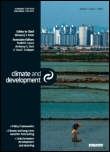
Climate and Development
Bridging Climate Science and Development PracticeClimate and Development is a leading interdisciplinary journal dedicated to addressing the multifaceted challenges posed by climate change and its intersection with sustainable development. Published by Taylor & Francis Ltd, this esteemed journal, with an ISSN of 1756-5529 and E-ISSN 1756-5537, provides a platform for innovative research that informs policy and practice across the globe. With its remarkable impact factor and recognized standing in the Q1 categories for Development and Geography, Planning and Development, along with notable positions in Global and Planetary Change, the journal is ranked in the top percentiles of Scopus, solidifying its influence within key academic fields. Climate and Development seeks to publish high-quality research articles, reviews, and case studies that contribute to a nuanced understanding of the implications of climate phenomena on socio-economic frameworks. This journal is essential for researchers, professionals, and students aiming to enhance their understanding of climate issues and contribute to sustainable development initiatives, ultimately striving for resilience in vulnerable communities around the world.
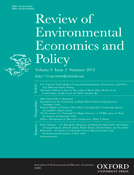
Review of Environmental Economics and Policy
Informing Policy with Cutting-Edge Research in Environmental EconomicsThe Review of Environmental Economics and Policy is a premier journal published by University of Chicago Press, dedicated to advancing the field of environmental policy and economics. Since its inception in 2008, the journal has provided a vital platform for interdisciplinary research that merges economic theory with environmental practice, highlighting its significance in addressing contemporary challenges such as climate change, resource management, and sustainability. With an impressive impact factor that places it in the Q1 quartile across both the Economics and Econometrics, and Management, Monitoring, Policy and Law categories, it ranks highly within Scopus, specifically at 43rd out of 716 and 39th out of 399, respectively. The Review of Environmental Economics and Policy is committed to disseminating high-quality research that not only informs policy-making but also engages a diverse audience of researchers, practitioners, and students. Although it is not an open-access journal, its contributions are indispensable for anyone looking to understand and influence the nexus of economics and environmental stewardship.